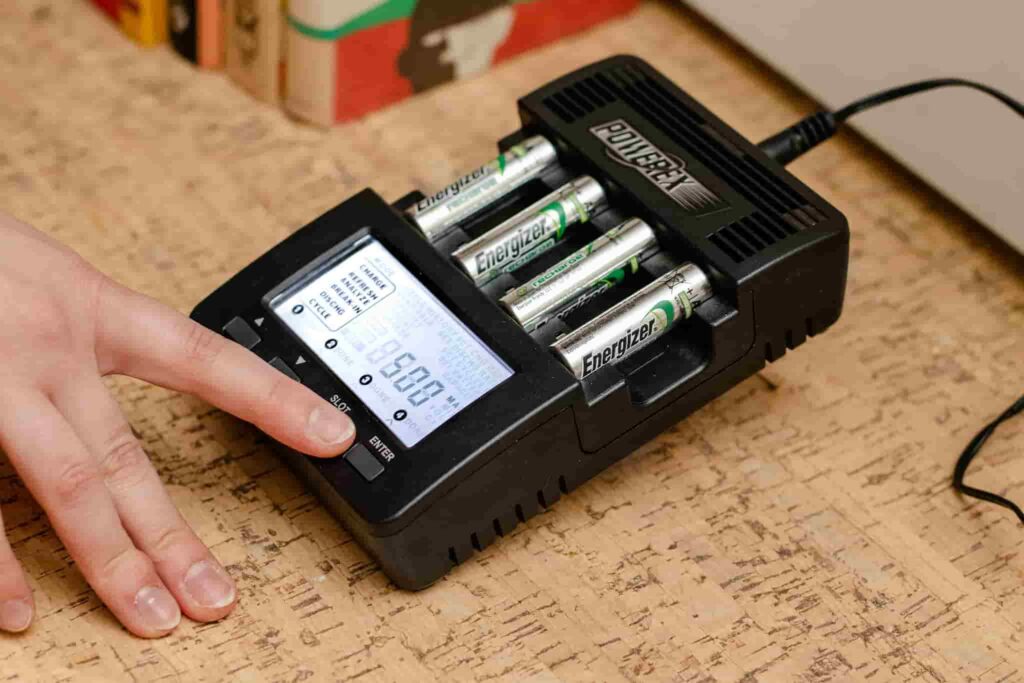Rechargeable batteries are crucial for powering everything from smartphones to electric vehicles. Lithium-ion batteries typically last 3-6 months, while NiMH batteries can retain up to 85% charge for a year.
In this guide, we’ll explore what affects how long rechargeable batteries last and share tips on how to make them work better for you.
Whether you’re interested in your smartphone’s battery or want to get the most out of your other rechargeable devices, this article offers useful advice.
What are rechargeable batteries?
These special types of batteries can be used, recharged, and used again multiple times. Unlike regular batteries, which you throw away after running out, rechargeable batteries can be plugged into a charger to regain power.

They are used in many devices, like phones, cameras, and laptops, helping save money and reduce waste.
Factors of rechargeable battery
The lifespan of a rechargeable battery per charge depends on several factors:
- Battery Type: Different batteries last for different cycles. Ni-Cd batteries can last 500-1,000 cycles, Ni-MH batteries handle 300-500 cycles, and Li-ion batteries can last 500-1,000 cycles or more with good care.
- Usage Patterns: Using only a small part of the battery and recharging before it’s empty can extend its life.
- Temperature: Extreme hot or cold temperatures can harm battery life. It’s best to use them within the suggested temperature range.
- Charging Habits: Overcharging or letting the battery completely drain can shorten its lifespan.
Read Also: Can Thermostat Battery Affect AC – Complete Details In 2024!
Lifespan of common rechargeable batteries
Nickel-cadmium (Ni-Cd) batteries:
Nickel-cadmium batteries are a type of rechargeable battery that typically lasts for 500 to 1,000 charge cycles.
They are durable and can handle heavy use, but they have a “memory effect,” meaning they need to be fully discharged before recharging to maintain their capacity. Ni-Cd batteries are commonly used in power tools and some older electronics.
Nickel-metal hydride (Ni-MH) batteries:
They are more environmentally friendly than Ni-Cd batteries and do not suffer from the “memory effect.” Ni-MH batteries are commonly used in devices like cameras, remote controls, and cordless phones. They hold more power than Ni-Cd batteries but can lose their charge faster when not in use.

Lithium-ion (Li-ion) batteries:
They are well-known rechargeable batteries with long life and high power capacity. They usually last for 500 to 1,000 charge cycles.
Li-ion batteries are commonly used in smartphones, laptops, and electric vehicles because they are lightweight and have a high energy density. They do not suffer from the “memory effect” and can be charged at any time.
Estimating battery life for different devices
Battery life varies based on the device and how much power it needs. Here’s a simple guide:
- Smartphones: Batteries last from a few hours to a full day, depending on how much you use the phone and its settings.
- Laptops: Battery life depends on screen brightness and usage, ranging from a couple of hours to several hours.
- Electric Vehicles (EVs): EVs can travel about 200-300 miles (320-480 kilometers) on a full charge, though this varies with driving conditions.
- Power Tools: Battery life ranges from a few minutes to several hours, depending on the tool’s power needs and battery size.
Read Also: How Many AMPs Are Car Batteries – Complete Detail in 2024!
How do you charge rechargeable batteries?
For rechargeable batteries, use the correct charger for the battery type. Place the battery in the charger and plug it into a power source. Follow the charger’s instructions for how long to charge. Avoid overcharging by removing the battery once it’s done.

How to prolong the rechargeable battery life?
Further, To prolong rechargeable battery life, avoid overcharging and deep discharging. Charge the battery before it’s empty and store it in a cool, dry place.
Keep the battery away from extreme temperatures. Use the right charger and follow the maker’s instructions. Regularly use and recharge the battery to keep it in good shape.
How long do rechargeable AA batteries last?
The batteries usually last for 300 to 500 charges. The actual usage time per charge depends on the device and how often you use it.
For example, in a remote control, they might last a few weeks before needing a recharge. Proper care, like avoiding overcharging and storing them correctly, can help them last longer.
Frequently Asked Questions:
1. How many times can a rechargeable battery be recharged?
A rechargeable battery can be recharged between 300 to 1,000 times, depending on the type. For example, NiMH batteries last around 500 charges, while Li-ion batteries can last up to 1,000 charges if taken care of properly.
2. Do rechargeable batteries run out of charge?
Yes, rechargeable batteries do run out of charge eventually. They need to be recharged regularly. Over time, their ability to hold a charge decreases, but they can still be used many times before needing replacement.
3. How long can rechargeable batteries sit?
When stored correctly, rechargeable batteries can keep their charge for several months to a few years. NiMH batteries usually hold about 70-80% of their charge after six months, while lithium-ion batteries can retain around 90% of their charge.
4. Do batteries last longer when fully charged?
Batteries do not last longer when fully charged. Keeping them fully charged for long periods can reduce their lifespan. It’s better to keep them partially charged and avoid extreme charges or discharges for longer battery life.
5. Do rechargeable batteries get weaker over time?
Rechargeable batteries get weaker over time because of how often they are used, charged, and stored. After about 500 charges, they can lose around 20% of their power.
6. Do rechargeable batteries drain when not in use?
Yes, rechargeable batteries do lose charge when not in use. They slowly drain over time, even if they are not being used. How quickly they drain depends on the battery type and storage conditions.
Conclusion:
In conclusion, Rechargeable batteries power a wide range of devices and can last for years with proper care. Their lifespan depends on the type of battery, how they are used, and how well they are maintained.
By following simple tips like using the correct charger, avoiding overcharging, and storing them properly, you can extend the life of your rechargeable batteries and get the most out of them.





